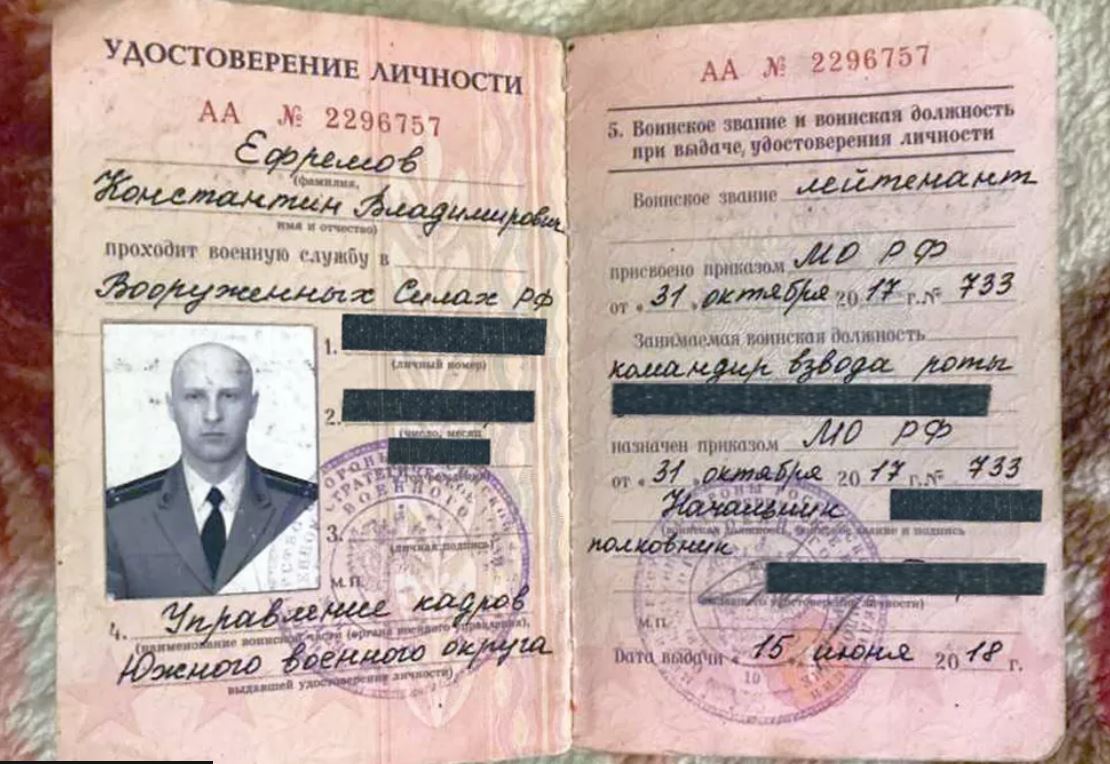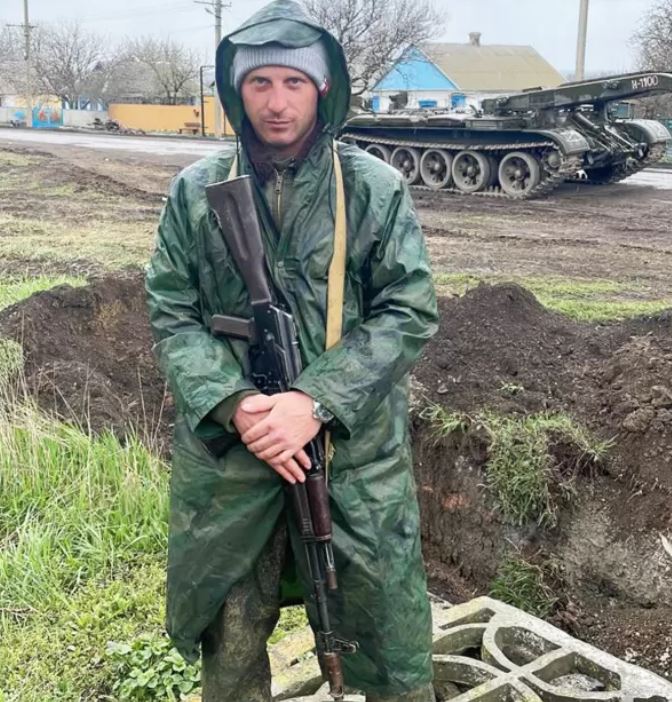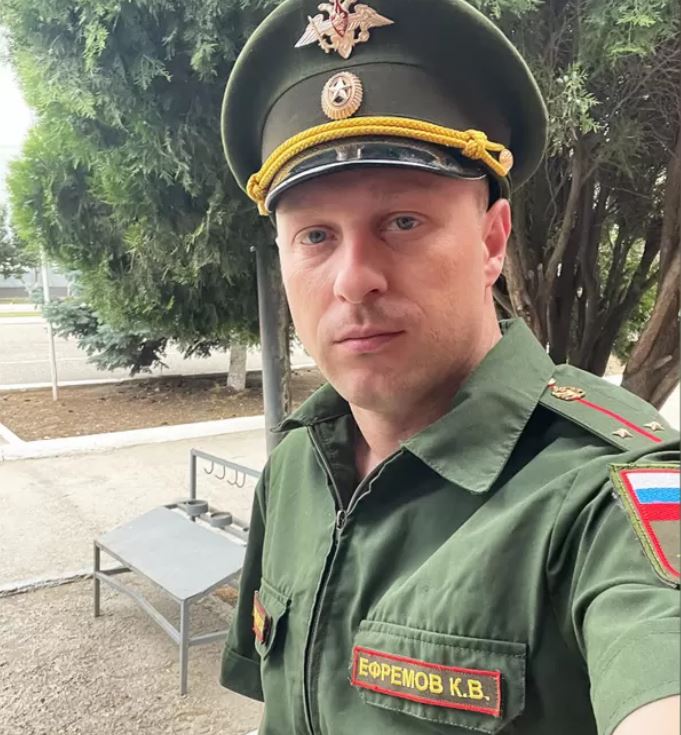
In a series of revelations about torture and generally speaking aggressive behavior Russian army in Ukraine go to BBC a former officer who, after leaving the front, also left Russiawhich he now calls him traitor And renegade.
OUR Konstantin Efremov reports, with evidence and testimonies, what happened brutal interrogationsduring which the Ukrainians they were shot and threatened with rape.
He noted that in one of the places in southern Ukraine, “interrogations and torture continued for about a week.” “Every day, at night, sometimes twice a day.”
K. Efremov tried several times to leave the army, but was eventually fired for refusing to return to Ukraine.
Using photo And military documents provided by Mr. Efremov, the BBC confirmed that at the beginning of the war he was in Ukraine – in the area of the city of Zaporozhyeincluding her city melitopolis.
Yefremov, until recently a Russian army officer, agreed to tell the BBC about the crimes he witnessed there, including torture And her cruel treatment of Ukrainian prisoners of war.
He talks about his comrades who they plundered the occupied territories of Ukraine and describes the brutal interrogations he conducted Russian colonelin which men were shot And they were threatened with rape.
IN February 10, 2022Efremov says he arrived at Crimeaa peninsula annexed by Russia nine years ago.
He commanded a demining unit. 42nd motorized divisionwhich is usually based in Chechnyain the North Caucasus of Russia.
He and his men were sent to participate in “military training” speaks.
“At that time, no one believed that there would be a war. Everyone thought it was just an exercise. I’m sure even the senior officers didn’t know about it.”

“I was afraid to give up”
K. Efremov recalls how Russian soldiers stuck identification marks on uniforms and painted over the letter “Z” in military equipment and vehicles. Within a few days, “Z” became a symbol of what the Kremlin called a “special military operation.”
The Russian officer claims he didn’t want to have anything to do with it. “I decided to retire. I went to my commander and explained my position. He took me to a senior officer who called me a traitor and a coward. I put down my gun, got into a taxi and left. I wanted to return to my base in Chechnya and officially retire. Then my companions called me with a warning. The colonel promised to put me in jail for up to 10 years for desertion and notified the police.”
K. Efremov called one military lawyerwho advised him to turn around. “Now I understand that I should have ignored it and continued,” he said, adding: “But I was afraid of going to jail.” Therefore, he returned and was integrated into his unit. He insists that he is “anti-war”. He assures the BBC that he did not take part in Russia’s annexation of Crimea and did not fight in eastern Ukraine when the war broke out in Ukraine. Donbassnine years ago.
2014Russia was accused not only of organizing a separatist rebellion there, but also of sending its own troops. Konstantin emphasizes that he did not take part in the Russian military operation in Syria. “For the past three years, I have been involved in clearing minefields in Chechnya, a place that survived two wars. I think the work I did there has benefited people.”
Bicycles and lawnmowers stolen
K. Efremov was temporarily appointed platoon commander. IN February 27Three days after the Russian invasion, he and his men were ordered to move north from occupied Crimea. They headed towards melitopolis. The next 10 days passed in one airport which was already occupied by Russian troops.
He describes the robberies he saw. “Soldiers and officers grabbed everything they could. They boarded all the planes and went through all the buildings. The soldier took the lawn mower. He proudly said, “I’m going to take this home and mow the grass next to our barracks.” “Buckets, axes, bicycles, they threw them all into their trucks. There were so many things that they themselves no longer fit in cars.
He sent photos to the BBC that he said he took at Melitopol Air Base. Show Shuttle planes and a burning building. They are among several images and documents he circulated – and the BBC confirmed – to confirm his identity, rank and movements in Ukraine in the spring of 2022.
Within a month and a half, along with eight soldiers under his command they guarded the Russian artillery unit there.
“We slept outside all the time,” he recalls, adding: “We got so hungry that we started hunting rabbits and pheasants. One day we arrived at the mansion. Inside was a Russian soldier. “We are from the 100th brigade and are now staying here,” he said. “There was so much food. Refrigerators were full. There was enough food to survive a nuclear war. But the soldiers who lived there caught Japanese carp in the pond outside and ate them.”

“I saw interrogations and torture”
Efremov’s team moved to guard what he calls the “logistics headquarters” in April – to the city. Bilmakin the northeast of Melitopol.
There, he says, he became a martyr interrogations and ill-treatment of Ukrainian prisoners. He remembers the day the three prisoners were brought in. “One of them confessed to being a sniper. Hearing this, the Russian colonel lost his mind. He hit him, pulled the pants off the Ukrainian and asked if he was married. “Yes,” replied the prisoner. “Then somebody will bring a mop,” said the Colonel. “Let’s make a girl out of you and send a video to your wife“.
On another occasion, he says, the colonel asked the prisoner to name all the Ukrainian nationalists in his unit. “The Ukrainian did not understand the question. He replied that the soldiers belonged to the infantry of the armed forces of Ukraine. Because of this answer, several of his teeth were broken.”
Kremlin from the very beginning, he had a specific goal: to make the Russians believe that they were fighting in Ukraine fascists, neo-nazis And ultranationalists. This false narrative serves to dehumanize Ukrainians in the eyes of the Russian public and the military.
K. Efremov notes that the Ukrainian prisoner was blindfolded. “The Colonel put a gun to the prisoner’s forehead and said, ‘I’ll count to three and then I’ll shoot you in the head. He counted and then shot him straight in the head from both sides. The Colonel started yelling at him. “Comrade Colonel! He doesn’t listen to you, you’re fooling him!” I told him.
He describes how the colonel ordered not to give the Ukrainians ordinary food – just water and crackers. “We tried to give them hot tea and cigarettes,” he says.
To prevent prisoners from sleeping on bare ground, K. Efremov still recalls how his fighters they threw hay “at night, so that no one can see us.”
During the next interrogation, he finds out that the colonel shot the prisoner in the arm – and in the right leg below the knee, which hit the bone.
He adds that his people bandaged the prisoner with bandages and went to the Russian commanders – “not to the colonel, he went crazy— and told them that the prisoner had to go to the hospital or he would bleed to death.
“We dressed him in Russian form and we took him to the hospital. We told him: “Don’t say that you are a Ukrainian prisoner of war, because either the doctors will refuse to treat you, or the wounded Russian soldiers will hear and shoot you, and we will not be able to stop them.”
UN Human Rights Office records cases of ill-treatment of prisoners of war in Ukraine. He interviewed over 400 prisoners, Ukrainians and Russians.
“Unfortunately, we found that both sides are using torture and ill-treatment of prisoners of war,” the statement said. Matilda Bognerhead of the UN monitoring group in Ukraine.
the worst forms of torture or ill-treatment Ukrainian POWs usually happen during interrogation, Ms Bogner says.
They may suffer electric shock and a whole range of torture methods: hanging or severe beatings. “When they arrive at the places of detention, the so-called welcome beatings take place. They also often face shortages of food and water,” he adds.
Russian prisoners of war also reported being beaten and tortured with electric shocks. “Any form of torture or ill-treatment is prohibited by international law,” he says.
The BBC has not been able to independently confirm Yefremov’s specific allegations of torture, but they are consistent with other allegations of mistreatment of Ukrainian prisoners.
Ministry of Defense of Russia did not respond to a request for comment.

“Traitor and Renegade”
In the end, Efremov returned to his sapper unit, but not for long. “Seven of us made the decision (to leave the army),” he says.
At the end of May, having returned to Chechnya, he wrote a letter of resignation. Some senior officers “began to threaten me. The officers, who had never been in Ukraine for a single day, told me that I was a coward and a traitor. They didn’t let me retire. I was fired.”
He shows documents from the army. In the first, he is accused of “avoiding his duties” and ignoring orders to return to Ukraine. This is described as a “serious breach of discipline”. The second letter refers to his “early dismissal from military service … due to breach of contract.”
“After 10 years of service, I was declared a traitor, a renegade just because I did not want to kill people,” he says, adding: “But I was happy that now I am a free person, that I do not need to kill or be killed.”
Source: BBC
Source: Kathimerini
Anna White is a journalist at 247 News Reel, where she writes on world news and current events. She is known for her insightful analysis and compelling storytelling. Anna’s articles have been widely read and shared, earning her a reputation as a talented and respected journalist. She delivers in-depth and accurate understanding of the world’s most pressing issues.